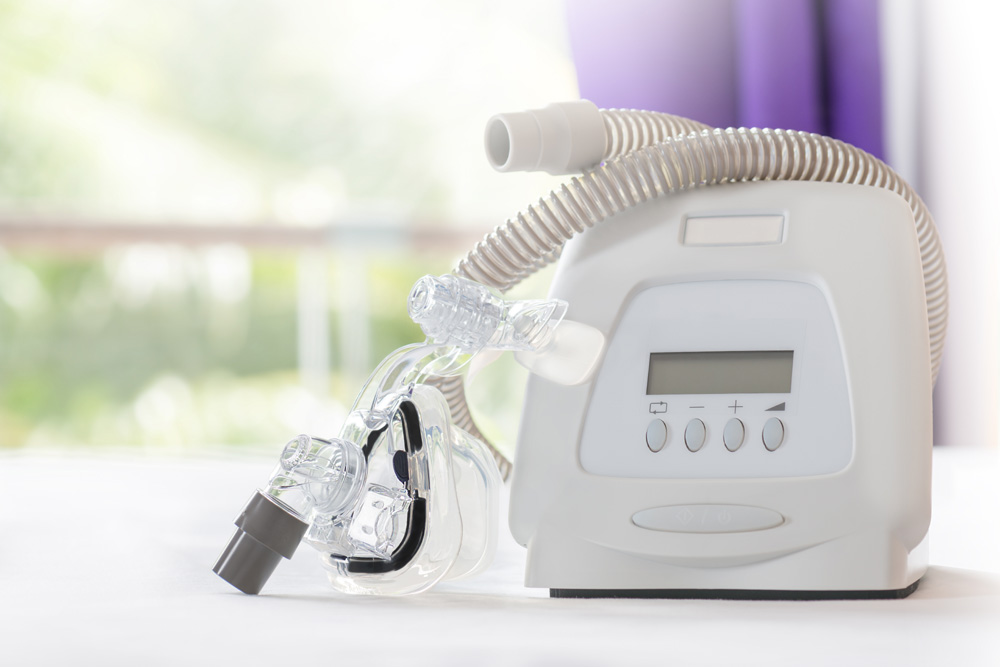Sleep apnea treatment often involves choosing between CPAP machines and dental sleep appliances. Each device works differently and offers unique benefits. Evaluating both options helps determine the best fit for your needs.
At Elizabeth L. Wakim, DDS, we can guide you through any healthcare decisions that affect your well-being and sleep health. Our team will ensure you get the treatment and help you need for any dental symptoms.
What Is a CPAP Machine?
A continuous positive airway pressure (CPAP) machine treats obstructive sleep apnea by providing a steady stream of air through a mask. This airflow keeps the airway open, preventing interruptions that reduce sleep quality and create health risks. The machine includes a motor, hose, and mask that covers the nose or mouth to maintain a continuous air supply. Many people experience improved sleep quality with CPAP therapy due to its ability to reduce apnea episodes.
Doctors often recommend CPAP machines as the primary treatment for sleep apnea. The device effectively keeps the airway open, improving both sleep and overall health. Some patients struggle with the mask’s fit or pressure settings, but adjustments help create a more comfortable experience.
What Is a Dental Sleep Appliance?
A dental sleep appliance repositions the jaw and tongue to keep the airway open. Dentists custom-fit these devices to ensure comfort and effectiveness. Many patients prefer them because they are small, lightweight, and easy to use compared to CPAP machines.
Dental sleep appliances work well for people with mild to moderate sleep apnea or those who find CPAP therapy uncomfortable. By slightly moving the jaw forward, these devices reduce airway blockages and improve sleep. Dentists can customize the fit to match each patient’s needs, ensuring proper positioning and long-term comfort. Dental sleep appliances provide a practical alternative for managing sleep apnea.
Pros and Cons of CPAP Machines
CPAP machines effectively treat sleep apnea and improve sleep quality. Many patients feel more rested and alert after beginning therapy, and advanced features like humidifiers and adjustable pressure settings help enhance comfort. However, some patients struggle with mask discomfort or noise from the machine.
Regular maintenance, including cleaning and replacing parts, keeps the machine functioning properly. The need for a power source may limit portability, though travel-friendly options exist. Weighing these advantages and drawbacks helps determine whether CPAP therapy suits your lifestyle and treatment needs.
Pros and Cons of Dental Sleep Appliances
Dental sleep appliances provide a comfortable, less intrusive alternative to CPAP therapy. Their small size and lack of required power make them convenient for travel, and many patients find them easier to use and adapt to compared to CPAP machines.
These devices may not work as well for severe sleep apnea, however. Some patients experience jaw discomfort or dental changes, requiring adjustments over time. Regular follow-ups with a dentist ensure proper fit and function.
Factors to Consider When Choosing the Right Option
Several factors influence whether a CPAP machine or a dental sleep appliance works best. The severity of sleep apnea often determines treatment choice. CPAP therapy remains the standard for moderate to severe cases, while dental sleep appliances work well for mild to moderate apnea.
Comfort and usability also play a role. Some patients struggle with CPAP masks, making a dental sleep appliance a better fit. Others may need the continuous airflow of a CPAP machine to manage symptoms. Consulting with a healthcare provider ensures the right treatment choice based on individual needs.
Making the Right Choice for Better Sleep
Choosing between a CPAP machine and a dental sleep appliance depends on comfort, effectiveness, and personal preference. Both options improve sleep quality and health when used consistently, and our team can help you determine the best option.
At Elizabeth L. Wakim, DDS, we assist clients in making informed healthcare decisions. Whether choosing a CPAP machine or a dental sleep appliance, finding the right solution leads to better rest and improved well-being. Call Elizabeth L. Wakim, DDS at (724) 558-8222 or fill out our contact form.

